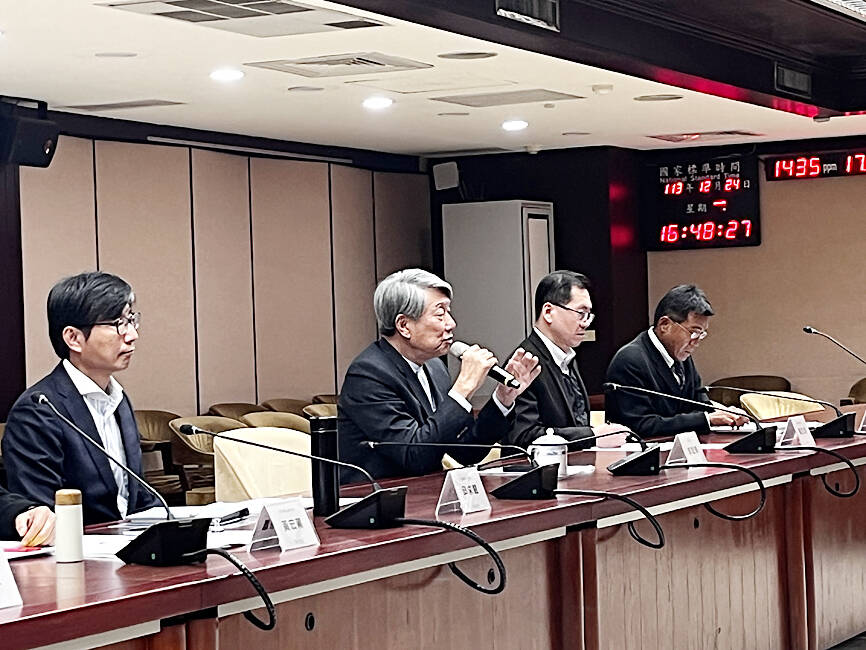The amendments to a budget law could undercut Taiwan’s artificial intelligence (AI) and technology development projects with global tech giants, the Ministry of Economic Affairs said yesterday.
After the amendments to the Act Governing the Allocation of Government Revenues and Expenditures (財政收支劃分法) passed the legislature on Friday, the ministry expects a budget deficit of NT$30 billion (US$918.3 million), including NT$11.6 billion in technology research subsidies, Minister of Economic Affairs J.W. Kuo (郭智輝) told a media briefing.
That would affect the ministry’s collaboration with the world’s major semiconductor companies, including Nvidia Corp, Advanced Micro Devices Inc (AMD), Micron Technology Inc, ASML Holding NV, Lam Research Corp and Synopsys Inc to bring new technologies to Taiwan, Kuo said.

Photo: Liao Chia-ning, Taipei Times
Micron plans to produce high-bandwidth memory chips at its Taiwan site, while Nvidia and AMD would set up new research and development (R&D) centers in the nation, Department of Industrial Technology Director-General Chiou Chyou-huey (邱求慧) said.
Such collaborations are essential parts of AI development in Taiwan, he said.
Those projects rely on years of research and technology deployment, and a lack of government budget could delay their progress, Chiou said.
The ministry has granted Nvidia NT$6.7 billion in subsidies for its AI innovation center in Taiwan from 2022 to 2027, while AMD is to receive NT$3.31 billion in subsidies for its new R&D center, the ministry said.
Nvidia and AMD are major customers of Taiwan Semiconductor Manufacturing Co (台積電), while Lam Research and ASML are key equipment suppliers to it.
Taiwan could risk damaging its reputation and losing its appeal to foreign investors if it cannot honor the contracts signed with foreign firms, Chiou said.
The ministry said that its efforts to support an F16 jet maintenance center, a space industry development program, and 6G industry and talent cultivation programs could be affected negatively.
The new government fund allocation rules would lead to allocation of NT$10 billion for a public construction budget and NT$7.44 billion in general spending, it said.
To cope with budget cuts, local governments should shoulder the responsibility of building flood prevention systems, water supply systems spanning administrative regions, as the ministry can no longer afford those expenses, it said.
Micro, small and medium-sized businesses would also face a lack of subsidies, it added.

ELECTRONICS BOOST: A predicted surge in exports would likely be driven by ICT products, exports of which have soared 84.7 percent from a year earlier, DBS said DBS Bank Ltd (星展銀行) yesterday raised its GDP growth forecast for Taiwan this year to 4 percent from 3 percent, citing robust demand for artificial intelligence (AI)-related exports and accelerated shipment activity, which are expected to offset potential headwinds from US tariffs. “Our GDP growth forecast for 2025 is revised up to 4 percent from 3 percent to reflect front-loaded exports and strong AI demand,” Singapore-based DBS senior economist Ma Tieying (馬鐵英) said in an online briefing. Taiwan’s second-quarter performance beat expectations, with GDP growth likely surpassing 5 percent, driven by a 34.1 percent year-on-year increase in exports, Ma said, citing government

UNIFYING OPPOSITION: Numerous companies have registered complaints over the potential levies, bringing together rival automakers in voicing their reservations US President Donald Trump is readying plans for industry-specific tariffs to kick in alongside his country-by-country duties in two weeks, ramping up his push to reshape the US’ standing in the global trading system by penalizing purchases from abroad. Administration officials could release details of Trump’s planned 50 percent duty on copper in the days before they are set to take effect on Friday next week, a person familiar with the matter said. That is the same date Trump’s “reciprocal” levies on products from more than 100 nations are slated to begin. Trump on Tuesday said that he is likely to impose tariffs

HELPING HAND: Approving the sale of H20s could give China the edge it needs to capture market share and become the global standard, a US representative said The US President Donald Trump administration’s decision allowing Nvidia Corp to resume shipments of its H20 artificial intelligence (AI) chips to China risks bolstering Beijing’s military capabilities and expanding its capacity to compete with the US, the head of the US House Select Committee on Strategic Competition Between the United States and the Chinese Communist Party said. “The H20, which is a cost-effective and powerful AI inference chip, far surpasses China’s indigenous capability and would therefore provide a substantial increase to China’s AI development,” committee chairman John Moolenaar, a Michigan Republican, said on Friday in a letter to US Secretary of

‘REMARKABLE SHOWING’: The economy likely grew 5 percent in the first half of the year, although it would likely taper off significantly, TIER economist Gordon Sun said The Taiwan Institute of Economic Research (TIER) yesterday raised Taiwan’s GDP growth forecast for this year to 3.02 percent, citing robust export-driven expansion in the first half that is likely to give way to a notable slowdown later in the year as the front-loading of global shipments fades. The revised projection marks an upward adjustment of 0.11 percentage points from April’s estimate, driven by a surge in exports and corporate inventory buildup ahead of possible US tariff hikes, TIER economist Gordon Sun (孫明德) told a news conference in Taipei. Taiwan’s economy likely grew more than 5 percent in the first six months